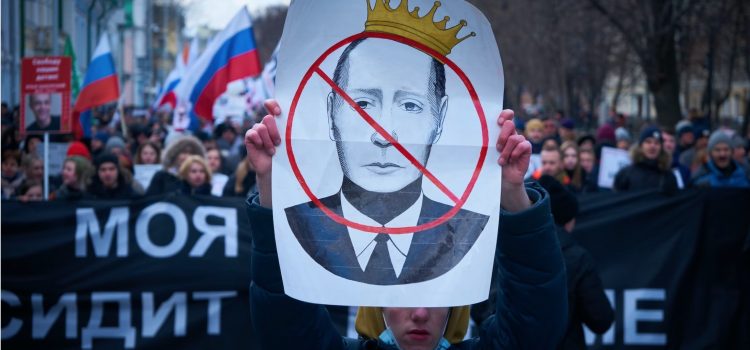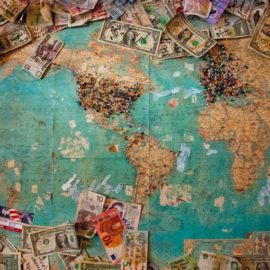
This is a free excerpt from one of Shortform’s Articles. We give you all the important information you need to know about current events and more.
Don't miss out on the whole story. Sign up for a free trial here .
What does “strongman leader” mean? What makes citizens vote for them? And what does this mean for democracy?
Strongman leaders are authoritarian leaders who mask their dictator-like actions behind a facade of democracy. From Russia’s Vladimir Putin to India’s Narendra Modi, these apparent autocrats have gained widespread appeal and are increasingly shaping global politics.
Read on to learn more about strongman leaders, their characteristics, and why they pose a threat to freedom.
Strongmen: The New Authoritarian Leaders
In the past, it was easy to spot authoritarians—they used brute force and blatant fascism to concentrate power. But today’s strongman leaders have learned from the mistakes of ousted autocrats and recognize that subtlety is the best strategy for longevity and impunity. According to some observers, they now maintain a veneer of democracy while stealthily furthering their own agendas—for example, they’ve set up organizations masquerading as citizen groups lobbying for their government on the international stage.
More specifically, the new authoritarian employs what journalist Moisés Naím calls the “3P” traits to amass power:
1) Populism: A strongman leader is bolstered by a cult of personality, appealing to common citizens and making them feel like he’s one of them. He manages to do this in paradoxical ways: While he may have a macho, alpha-male personality, he also plays the victim to gain people’s sympathy—for example, the US’s Donald Trump and Italy’s Silvio Berlusconi both claimed they were victims of a witch hunt. To give them a positive image both domestically and abroad, strongmen also hire public relations firms.
Additionally, Rachman (The Age of the Strongman) says that the new authoritarians tend to be “nostalgic nationalists”—they inspire nationalistic fervor by promising to bring back their country’s glory days. For example, Donald Trump’s stated aim was to “make America great again”; other leaders like Russia’s Valdimir Putin and China’s Xi Jinping have expressed similar sentiments for their own countries. According to some, one damaging by-product of this nationalist fixation is their tendency to be climate change skeptics: Their nationalist aims aren’t aligned with big issues requiring international cooperation, so they deny that climate change is a problem or downplay it by saying it’s a globalist plot to take advantage of the masses.
2) Polarization: Strongmen often trumpet an “us versus them” narrative; there is no longer a political middle ground. Anyone seen as disagreeing with them can’t be trusted and must thus be kept out of power by any means, write Steven Levitsky and Daniel Ziblatt in How Democracies Die. An example of this in action is the January 6 insurrection, which attempted to overturn the results of the US presidential election.
3) Post-truth politics: Many accuse strongman leaders of muddying the waters with disinformation—leveraging the internet and social media—to create public confusion about what is true. As Imelda Marcos, wife of deposed Philippine dictator Ferdinand Marcos Sr., says, “Perception is real, but the truth is not.” (It’s worth noting that the Marcoses themselves have apparently learned from their past mistakes. After being booted out of the country in 1986, the family is back in power: Ferdinand Jr. won the 2022 presidential election through a campaign that relied heavily on historical revisionism and misinformation. His sister is a senator, and his son—a rookie member of congress—is now the senior deputy majority leader.)
Strongman Leaders Around the World
Experts say this three-pronged approach has enabled today’s authoritarians to chip away at democratic norms, from Europe to Latin America to Asia:
Russia: Putin has imprisoned political foes based on drummed-up charges. Observers opine that he’s so used to getting his way that no one could discourage him from invading Ukraine.
Turkey: Recep Tayyip Erdogan issued presidential decrees to give him virtually unlimited, unchecked control over the levers of government. He has also jailed journalists and promoted patronage politics.
Brazil: Jair Bolsonaro has restricted access to government information, attacked the Supreme Court, and supported policies that undermine the rights of women and the disabled. He baselessly claims that there will be electoral fraud in the October 2022 elections, undercutting people’s faith in the process and setting the stage for a protest should he lose.
Philippines: Erstwhile president Rodrigo Duterte launched a “war on drugs,” which resulted in thousands of extrajudicial killings. Rather than resorting to the old-authoritarian tactic of censorship, he branded a news site that was critical of him as “fake news” and openly admits to closing down a TV network that got on his bad side.
India: Under Narendra Modi, India passed a controversial citizenship law, seen as discriminatory against Muslims. Modi also granted government agencies the power to monitor all computers in the country.
Saudi Arabia: Mohammed bin Salman (popularly known as MBS) has cracked down on dissenters and liberals such as women’s rights advocates and arrested some of the countries’ richest people allegedly for corruption. Many are too afraid to speak up against him.
Freedom House lists other strongman leaders installed through farcical elections (such as Nicaragua’s Daniel Ortega) and power grabs by those emboldened by international apathy (the Sudan military seizing control of the government). It also mentions countries benefiting from alliances with and assistance from other strongman-led nations (for example, the Maduro regime in Venezuela has had help from Russia, China, Cuba, Iran, and Turkey).
Why People Are Voting Them Into Power
Despite all this, many strongman leaders are still coming into power by democratic means—even though some places may have sham elections, voters in other countries are still legitimately electing autocrats. But why? Aside from being influenced by the 3Ps, people may support these leaders for the following reasons:
Reason #1: Socio-Economic Factors
Research suggests that countries with bigger wealth gaps are more likely to choose “strong leaders.” This may be because people attribute economic inequality to a breakdown in society and in government, and they believe a strongman’s hardline approach can fix whatever is wrong. To them, a vote for a strongman leader is a hopeful vote for change.
Other research suggests that levels of education are a big factor in voting preferences: The more highly educated a country’s citizens are, the lower the likelihood that they’ll vote for an authoritarian.
Reason #2: Fear
The desire for an authoritarian leader can also emerge when people who are comfortable with the status quo are afraid of change and their potential loss of power. As historian and author Ruth Ben-Ghiat asserts, periods of social progress (in gender and race equity, for example) are typically met with some pushback. Rachman points out that it isn’t a coincidence that all the new authoritarians are men, an indication of the backlash against women’s progress.
People’s fear of the coronavirus pandemic also gave leaders a golden opportunity to concentrate power: They knew people would be more willing to give up some freedoms in exchange for safety.
Stemming the Tide of New Authoritarianism
To reverse the trend towards strongman leaders, Freedom House says that it’s crucial to increase international coordination and develop policies that strengthen democratic systems and safeguard the freedoms and well-being of each country’s people. But more than developing policies, experts believe that it may be time to rethink democracy. They note that merely holding elections every few years is an outdated model as it doesn’t lead to an accurate representation of the will of the people, particularly on divisive issues. It’s necessary to revisit democratic institutions and systems that were established in the 19th century and restructure them to meet today’s challenges.

Want to fast-track your learning? With Shortform, you’ll gain insights you won't find anywhere else .
Here's what you’ll get when you sign up for Shortform :
- Complicated ideas explained in simple and concise ways
- Smart analysis that connects what you’re reading to other key concepts
- Writing with zero fluff because we know how important your time is






